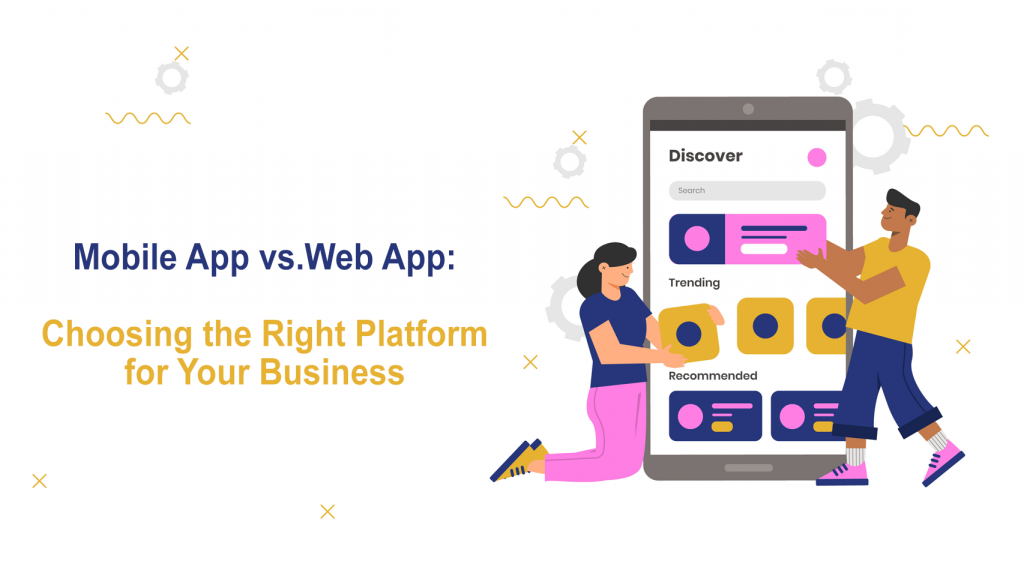
In today’s digital age, businesses and developers decide whether to build a mobile app, a web app, or perhaps both. Effective decision-making is essential for achieving desired outcomes, as each platform presents its own set of advantages and disadvantages. This blog will explore the differences between mobile and web apps, their advantages and uniqueness, and factors to consider when choosing the right platform for your project.
What are mobile apps?
Mobile apps, short for mobile applications, are software applications specifically designed to run on mobile devices such as smartphones, tablets, smartwatches, and other handheld devices. These apps are developed to provide users with various functionalities, services, entertainment, or tools directly on their mobile devices.
How are mobile apps built?
Mobile apps incur higher development costs than web applications and are tailored to specific platforms.
Typically, creating a mobile app for different platforms entails starting from scratch in design and development. However, they boast faster performance and offer advanced functionalities and features.
Native mobile apps are crafted using specific programming languages and Integrated Development Environments (IDEs) tailored to the targeted platform.
For instance, iOS-powered devices utilize Apple’s native OS, prompting developers to use either Swift or Objective-C in conjunction with the Xcode IDE for Apple app development.
On the other hand, native Android apps are coded in Java and are predominantly developed using Eclipse IDE or Android Studio.
Both Google and Apple offer their development kits, tools, and software development kits (SDKs), which developers can utilize to construct native mobile applications.
Advantages of mobile apps:
Performance: Mobile apps are often faster and more responsive than web apps since they can leverage the device’s hardware and native functionalities.
User Experience: With access to device features like GPS, camera, and push notifications, mobile apps can offer a richer and more immersive user experience.
Offline Functionality: Many mobile apps can still function offline or with limited connectivity, providing uninterrupted access to content and features.
Monetization Opportunities: Mobile apps can be monetized through various channels such as app purchases, in-app purchases, subscriptions, and advertisements.
What are web apps?
Web apps, short for web applications, are software applications that are accessed and used through a web browser over the internet. They are designed to provide users with functionalities like traditional desktop applications but with the convenience of being accessed from any device with an internet connection and a compatible web browser without installation.
How are web apps built?
Typically, web apps are developed using CSS, HTML5, and JavaScript. Unlike mobile apps, no standardized software development kit exists for building web apps. However, developers have access to various templates.
Compared to mobile apps, web applications are often quicker and simpler to develop, yet they offer greater accessibility in terms of features.
A rising trend is progressive web apps (PWAs) leveraging recent browser advancements to imbue web apps with functionalities akin to mobile applications.
Nevertheless, support and functionality across operating systems (OS) still lag behind genuine mobile apps.
Advantages of web apps:
Cross-Platform Compatibility: Web apps can run on any device with a web browser, making them accessible across different platforms and devices.
More accessible Updates: Unlike mobile apps that require users to download updates manually, web apps are updated automatically, ensuring all users can access the latest version.
Lower Development Cost: Developing a web app often requires knowledge of standard web technologies like HTML, CSS, and JavaScript, potentially reducing development costs compared to native mobile apps.
No App Store Approval: Since web apps are accessed via a browser, there’s no need to go through the app store approval process, allowing for more flexibility and quicker deployment.
Conclusion
In conclusion, both mobile apps and web apps have their own set of advantages and disadvantages. The choice between the two depends on your project requirements, target audience, budget, and timeline. Ultimately, weighing these factors carefully and choosing the platform that best aligns with your goals and objectives is essential. Whether you opt for a mobile app, a web app, or a combination of both, prioritizing user experience and functionality is vital to the success of your digital venture.
KARYA Technologies stands at the forefront of innovation, offering cutting-edge solutions to meet the diverse needs of our clients. With mobile and web app development expertise, we empower businesses to thrive in today’s digital landscape. Whether reaching users on the go with intuitive mobile applications or delivering seamless experiences through responsive web apps, we are committed to driving success and growth for our clients. Partner with us to unlock the full potential of your digital presence and stay ahead in an ever-evolving market.
For details, please visit https://www.karyatech.com/.